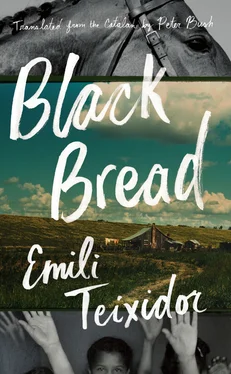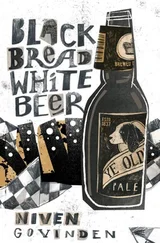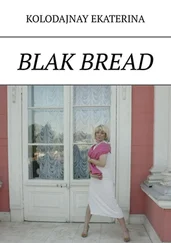Emili Teixidor - Black Bread
Здесь есть возможность читать онлайн «Emili Teixidor - Black Bread» весь текст электронной книги совершенно бесплатно (целиком полную версию без сокращений). В некоторых случаях можно слушать аудио, скачать через торрент в формате fb2 и присутствует краткое содержание. Год выпуска: 2016, Издательство: Biblioasis, Жанр: Современная проза, на английском языке. Описание произведения, (предисловие) а так же отзывы посетителей доступны на портале библиотеки ЛибКат.
- Название:Black Bread
- Автор:
- Издательство:Biblioasis
- Жанр:
- Год:2016
- ISBN:нет данных
- Рейтинг книги:3 / 5. Голосов: 1
-
Избранное:Добавить в избранное
- Отзывы:
-
Ваша оценка:
- 60
- 1
- 2
- 3
- 4
- 5
Black Bread: краткое содержание, описание и аннотация
Предлагаем к чтению аннотацию, описание, краткое содержание или предисловие (зависит от того, что написал сам автор книги «Black Bread»). Если вы не нашли необходимую информацию о книге — напишите в комментариях, мы постараемся отыскать её.
Born in 1933,
's first novel,
, was published to tremendous acclaim in 1988, followed by several more which established him as one of Spain's greatest contemporary authors.
Black Bread — читать онлайн бесплатно полную книгу (весь текст) целиком
Ниже представлен текст книги, разбитый по страницам. Система сохранения места последней прочитанной страницы, позволяет с удобством читать онлайн бесплатно книгу «Black Bread», без необходимости каждый раз заново искать на чём Вы остановились. Поставьте закладку, и сможете в любой момент перейти на страницу, на которой закончили чтение.
Интервал:
Закладка:
This feeling of incompleteness, of imperfection, could be experienced as a kind of mutilation which I interpreted as an aspect of my immaturity, I thought that later on, when I was more experienced I’d know how to fill that gap, that lack, and that adult couples must have managed to do that, to make it whole, without any fissures, because people couldn’t possibly live peacefully with another person for so many years if they were suffering the anguish caused by having one’s body in one place with a person and one’s thoughts in another with someone else.
As I was left alone that summer and on the farm they took care not to burden me with any jobs, even Dad Quirze’s ferrety eyes looked at me more wryly and he thought twice before speaking to me, and I started to fantasize about whether I really was my parents’ child, or if it was simply a coincidence I’d come to be with them. I found the idea I was an adoptive son very appealing, that I was somebody now simply changing direction and going to live with a family that was as fake as his first one, even though some experiences and memories were too vivid and striking to allow me to push my fantasy much further. In a way, those thoughts were a way of punishing my parents, a kind of revenge for the losers’ fate they’d inflicted on me, and the height of satisfaction I reached in these fantasies were greater than the remorse triggered by the potential betrayal they represented. I’d discovered the power of hatred and now developed a liking for betrayal, for the arrogant flourish of pride embodied by the rejection of my family, my roots, of my entire past. I thought how it was like what I’d felt as a child when I really wanted something I was being refused and later when it was allowed, I wouldn’t accept it, as if I’d never wanted it in the first place, as if my final refusal was a deserved pay-off for the initial denial I’d been forced to suffer. “I don’t want it now,” were my exact words, “I don’t want it now! I am the one that doesn’t want it now!”
That summer I spent a week with my mother in town, the week my mother was on holiday, and those few days served as the farewell to my other family landscape. My friends in town and our neighbours already knew I’d be going to study in another city at the start of the next school year, sponsored by some very pious folk, the masters of my paternal grandparents, and they all treated me in the same distant way I’d noted on the farm, that was perhaps even colder and more intense, as if I’d wanted to distance myself from them and their fate, and once again I felt like a traitor and deep down I accepted I was. “I am the one who doesn’t want you now!”
When Mother’s holidays came to an end and she went back to work, I returned to the farm to see out the holidays. Cry-Baby informed me of the big news of what had happened to Pere Màrtir in my absence. They’d not talked about anything else for a couple of days. They seemed very worried about him, evidently he’d been found on a solitary side street in Vic, in the early hours, lying on the ground because he was so drunk he couldn’t stand up. They said he’d left a café where the local first-born and heirs gambled their duros and doubloons away, a café for card sharps — the expression was Grandmother’s — that organized clandestine games behind closed doors, after official closing time, when the usual customers had left. The card sharps played on till the first light of dawn, sometimes till the café opened in the morning and the farmers going to market came in for breakfast. They also commented how Pere Màrtir was on his way to losing his bulls and his bells — another local expression, this time from Aunt Ció—and that Aunt Enriqueta was responsible for the lad’s lunacy. “That joker Enriqueta will lose the lot, whatever she had and whatever she’s got now, because the friar-boy who hung up his habits on a fig tree won’t last her a couple of months!” Dad Quirze cursed, and they talked about going to fetch her from Barcelona to see if she could help the poor lad, Pere Màrtir, pull through, so he didn’t meet a bad end like some stony-broke rake.
The news surprised me because I thought of Aunt Enriqueta and Pere Màrtir as figures from my past, and I now found it a strain to think about them, a bit like Uncle Fonso, who’d fled to France, or Cry-Baby’s mother, who were never mentioned, as if they didn’t exist, like my own father, who, once dead, had turned into a memory, I now had to abandon all these people I’d come across in life, forget those waifs and strays on endless, dark streets in big cities and distant countries, separated from me by the frontiers of age and invisible mountains; I’d exhausted my curiosity about them, they no longer meant anything to me.
However, the detail of the nighttime gambling den in the bishop’s city, with the ever-attractive image of a dejected Pere Màrtir, laid low by misfortune and abandoned in the middle of the street, revived the sympathy he’d always inspired in me and I found room for him in my private oratory, on the altar reserved for hapless heroes, stricken down by sickness, desertion, the death sentence, or sexual offers, alongside the boy with TB in the heartsease garden, Cry-Baby and her white, gently sloping belly, Father striped zebra-like by prison bars with his blue stillborn stare and sunken, unshaven cheeks, Aunt Mariona ravaged by the big city and transformed into a sticky saccharine pudding, Aunt Felisa crossing the woods at midnight to come and cry in Mother’s skirts because she didn’t want to marry the ogre they’d chosen for her, or Mad Antònia from Can Tona walking naked through the woods searching for the ghost of a boyfriend who’d been executed right in front of her eyes.
And apart from that addition of a new image to my private universe, questions came to me like why were they insisting on mixing Aunt Enriqueta up in that episode, if she’d already paired up with the Saint Camillus novice and, as we’d deduced, her belly was even swollen because “she was expecting,” as Aunt Cío and Grandmother said, wasn’t that enough to withdraw her from circulation? This meant Aunt Enriqueta might appear to us as easily as a witch from the woods as a fairy working miracles with her hands on a sewing machine or wherever she was now, hands of gold, everybody said, hands that would never allow her to go hungry, a fairy’s fingers, in fact, and I didn’t understand what powers she possessed to save Pere Màrtir from anything at all. And how come Pere Màrtir couldn’t get Aunt Enriqueta out of his head — he carries her deep in his blood, said Grandmother, and Dad Quirze said she would drive the lad crazy — what had she given him, what kind of love did he harbour for her that he couldn’t disentangle himself from her or couldn’t live without her? The madness of love, like the lunacy of gambling, must be an infection, an illness like tuberculosis that dried out some people’s lungs and conversely let others breathe quietly and peacefully — a mystery. And it was my fascination for this unknown world that brought me close to Pere Màrtir or the boy with TB in the monastery or Mad Antònia or Cry-Baby, my conviction that they were beings fated to carry a burden through life that others were unwittingly freed from — like someone born into an untrammelled existence who thinks his state is perfectly natural, who never reflects that he was born with a drawback — and that’s why the former live their lives more frivolously, more unconsciously, skating over the surface, and struggling to grasp the submerged, melancholy, daydreaming character of those who carry the burden of a ballast of lead.
The latter seemed like beings fated to self-sacrifice, who travelled the world with the air of dogs without a master, starving and battered, but irradiating a mysterious attraction that only other victims destined to similar sacrifices could appreciate. This explained why boys and girls entered seminaries and convents, drawn by the magnetism of figures like Saint Lucia with her empty eye sockets and erect forehead awaiting an invisible light, or Saint Sebastian tied to a tree, his chest and legs full of arrows that pierced his flesh with an array of red flowers, who despite his suffering, held his head high with a strangely happy smile on his face, or Saint Camillus of Lellis in his white habits clawed at by the skeletal hands of the sick and wretched and yet he smiled blissfully and turned his eyes to heaven as if grateful for the suffering strewn on his path and the dozens of crosses bearing the Son of God crowned with thorns, beaten, nailed through his hands and feet, his ribs split open by spears, and transformed by this Calvary into a Redeemer, King and Saviour.
Читать дальшеИнтервал:
Закладка:
Похожие книги на «Black Bread»
Представляем Вашему вниманию похожие книги на «Black Bread» списком для выбора. Мы отобрали схожую по названию и смыслу литературу в надежде предоставить читателям больше вариантов отыскать новые, интересные, ещё непрочитанные произведения.
Обсуждение, отзывы о книге «Black Bread» и просто собственные мнения читателей. Оставьте ваши комментарии, напишите, что Вы думаете о произведении, его смысле или главных героях. Укажите что конкретно понравилось, а что нет, и почему Вы так считаете.












